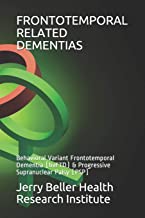Frontotemporal Cognitive Disorder
Resources for Patients and Caregivers
Frontotemporal disorders (FTD), sometimes called frontotemporal dementia, are the result of damage to neurons in the frontal and temporal lobes of the brain. Many possible symptoms can result, including unusual behaviors, emotional problems, trouble communicating, difficulty with work, or difficulty with walking.
Cluster Number:
Wiki Number: 19-Frontotemporal Cognitive Disorder
Diagnosis:
US Patients:
World Patients:
Sex Ratio:
Age Onset:
Brain Area: frontal lobe
Symptoms: difficulties with cognitive (movement and speech), emotional or behavioral activities
Progression:
Causes: brain injuries, frontotemporal-dementia or Alzheimer’s diseases
Medications:
Therapies: speech therapy
Youtube Video: 60 Minutes Archive: Frontotemporal Dementia
Amazon or Library Book: Frontotemporal Related Dementias
Click the book to link or order from Amazon.

